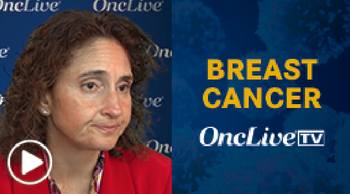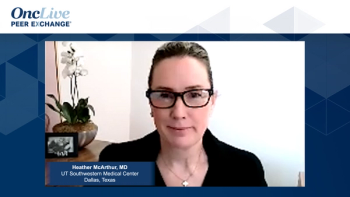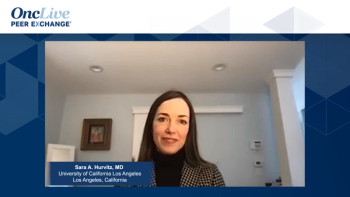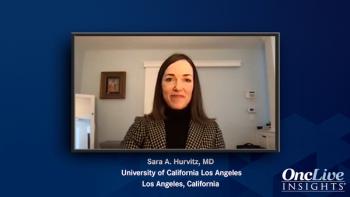
Drs Tripathy and McArthur touch on the use of extended adjuvant therapy with neratinib and identify patients who might be suitable for this regimen, including those high-risk patients with residual disease after neoadjuvant therapy.

Your AI-Trained Oncology Knowledge Connection!


Virginia Kaklamani, MD, DSc, is a professor of medicine in the Division of Hematology-Medical Oncology at The University of Texas Health Science Center San Antonio, as well as the leader of the breast cancer program at the Mays Cancer Center, home to the UT Health San Antonio MD Anderson Cancer Center

Drs Tripathy and McArthur touch on the use of extended adjuvant therapy with neratinib and identify patients who might be suitable for this regimen, including those high-risk patients with residual disease after neoadjuvant therapy.

Focused discussion on treatment guidelines and recommendations for fertility preservation while treating premenopausal patients with breast cancer.

A brief review of monitoring, response assessment, and treatment modification strategies used for patients with breast cancer undergoing OFS. .

Virginia G. Kaklamani, MD, DSc, and Melinda L. Telli, MD, review the various adjuvant therapy options available for patients with HER2+ early breast cancer based on stage, risk status, and whether or not they had received neoadjuvant therapy, and then touch on clinical data supporting the use of fixed-dose pertuzumab/trastuzumab (PH) in this setting.

Dr Tripathy provides clinical insight on how he assesses HER2+ eBC patient response to neoadjuvant therapy, discusses the typical prognosis for those who do or do not have residual disease, and touches on how he might approach adjuvant treatment selection for each.

Expert perspectives on the appropriate selection and use of OFS in premenopausal patients with breast cancer.

Matteo Lambertini, MD, PhD, and Virginia Kaklamani, MD, DSc, reflect on the SOFT and TEXT clinical trials to elucidate combination treatment strategies with ovarian function suppression (OFS).

Panelists expand upon the most important clinical factors that inform selection amongst available systemic therapy regimens in the neoadjuvant setting of HER2+ eBC, comment on the potential for treatment de-escalation in lower-risk patients, and discuss exciting treatments on the horizon.

Heather McArthur, MD, and Debu Tripathy, MD, lead a discussion on risk stratification and optimizing treatment for HER2+ early breast cancer (eBC), followed by a review of standard-of-care systemic therapy regimens in the preoperative/neoadjuvant setting.

Comprehensive insight to available gonadotropin-releasing hormone (GnRH) agonists in breast cancer and the role they play when thinking about fertility preservation.

Key opinion leaders on breast cancer management provide a broad overview of fertility preservation strategies available to patients.

Focused discussion on the incidence of chemotherapy-induced menopause in patients receiving treatment for their breast cancer.

Expert oncologists Matteo Lambertini, MD, PhD, and Virginia Kaklamani, MD, DSc, reflect on the subset of patients with breast cancer who are premenopausal and how that impacts their approach to disease management.

A key opinion leader in breast cancer management shares insight on the treatment armamentarium for patients with HER2+ disease.

Closing out their discussion on HR+ breast cancer management, expert panelists share their excitement for the evolving treatment paradigm.

Virginia Kaklamani, MD, discusses the utilization of elacestrant following treatment with CDK4/6 inhibitors in patients with estrogen receptor-positive, HER2-negative metastatic breast cancer.

Comprehensive discussion on novel treatment modalities in HR+ metastatic breast cancer and insight to when it is appropriate to select these agents.

Shared insight on the selection of endocrine partners while managing patients in the relapsed/refractory setting of HR+ metastatic breast cancer.

Closing out their review on treatment strategies for HER2-expressing breast cancer, panelists share practical advice for the community setting.

Key opinion leaders consider when it is appropriate to continue CDK4/6 inhibition at progression of disease in the setting of HR+ metastatic breast cancer.

A brief review of the role molecular profiling plays at a patient’s relapse with HR+ metastatic breast cancer.

Panelists share a brief discussion on early-stage HER2-low breast cancer and identify treatment options available in that setting.

Comprehensive insight on evolving management strategies for patients diagnosed with HER2-low breast cancer.

Expert perspectives on factors that aid in the selection of optimal first-line therapy for patients with HR+ metastatic breast cancer.

Shifting their focus to HR+ metastatic disease, expert panelists consider the importance of molecular profiling and first-line treatment options.

Virginia Kaklamani, MD, discusses how racial disparities may affect patient outcomes and treatment expectations based on data from the RxPONDER trial in breast cancer.

Centered discussion on the advent of HER2-low breast cancer and how it is differentiated from HER2+ and HER2- disease.

Expert panelists provide a broad overview on HER2+ breast cancer and review the evolving treatment armamentarium.

A brief review of prevalent clinical trials in the early-stage HR+ breast cancer paradigm and how they help to inform treatment decision-making.

Key opinion leaders in breast cancer management discuss Ki67 and the monarchE trial, which analyzed abemaciclib therapy in the HR+ space.